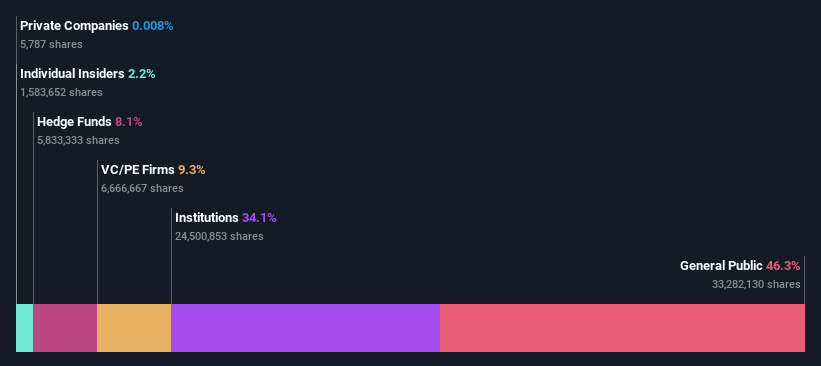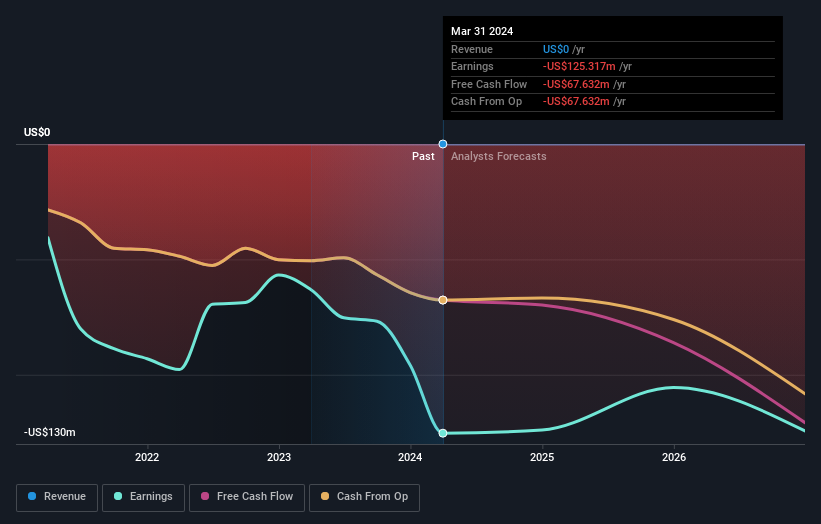Mind Medicine (MindMed) Inc.'s (NASDAQ:MNMD) 18% loss last week hit both individual investors who own 46% as well as institutions
Key Insights
Significant control over Mind Medicine (MindMed) by retail investors implies that the general public has more power to influence management and governance-related decisions
A total of 25 investors have a majority stake in the company with 49% ownership
Every investor in Mind Medicine (MindMed) Inc. (NASDAQ:MNMD) should be aware of the most powerful shareholder groups. With 46% stake, retail investors possess the maximum shares in the company. In other words, the group stands to gain the most (or lose the most) from their investment into the company.
While the holdings of retail investors took a hit after last week’s 18% price drop, institutions with their 34% holdings also suffered.
Let's take a closer look to see what the different types of shareholders can tell us about Mind Medicine (MindMed).
See our latest analysis for Mind Medicine (MindMed)
What Does The Institutional Ownership Tell Us About Mind Medicine (MindMed)?
Many institutions measure their performance against an index that approximates the local market. So they usually pay more attention to companies that are included in major indices.
Mind Medicine (MindMed) already has institutions on the share registry. Indeed, they own a respectable stake in the company. This can indicate that the company has a certain degree of credibility in the investment community. However, it is best to be wary of relying on the supposed validation that comes with institutional investors. They too, get it wrong sometimes. It is not uncommon to see a big share price drop if two large institutional investors try to sell out of a stock at the same time. So it is worth checking the past earnings trajectory of Mind Medicine (MindMed), (below). Of course, keep in mind that there are other factors to consider, too.
It looks like hedge funds own 8.1% of Mind Medicine (MindMed) shares. That worth noting, since hedge funds are often quite active investors, who may try to influence management. Many want to see value creation (and a higher share price) in the short term or medium term. Our data shows that Deep Track Capital, LP is the largest shareholder with 9.3% of shares outstanding. Meanwhile, the second and third largest shareholders, hold 8.1% and 3.5%, of the shares outstanding, respectively.
A deeper look at our ownership data shows that the top 25 shareholders collectively hold less than half of the register, suggesting a large group of small holders where no single shareholder has a majority.
While studying institutional ownership for a company can add value to your research, it is also a good practice to research analyst recommendations to get a deeper understand of a stock's expected performance. There are plenty of analysts covering the stock, so it might be worth seeing what they are forecasting, too.
Insider Ownership Of Mind Medicine (MindMed)
While the precise definition of an insider can be subjective, almost everyone considers board members to be insiders. The company management answer to the board and the latter should represent the interests of shareholders. Notably, sometimes top-level managers are on the board themselves.
Most consider insider ownership a positive because it can indicate the board is well aligned with other shareholders. However, on some occasions too much power is concentrated within this group.
We can report that insiders do own shares in Mind Medicine (MindMed) Inc.. In their own names, insiders own US$12m worth of stock in the US$533m company. It is good to see some investment by insiders, but it might be worth checking if those insiders have been buying.
General Public Ownership
The general public, who are usually individual investors, hold a 46% stake in Mind Medicine (MindMed). While this size of ownership may not be enough to sway a policy decision in their favour, they can still make a collective impact on company policies.
Private Equity Ownership
Private equity firms hold a 9.3% stake in Mind Medicine (MindMed). This suggests they can be influential in key policy decisions. Some investors might be encouraged by this, since private equity are sometimes able to encourage strategies that help the market see the value in the company. Alternatively, those holders might be exiting the investment after taking it public.
Next Steps:
It's always worth thinking about the different groups who own shares in a company. But to understand Mind Medicine (MindMed) better, we need to consider many other factors. Consider for instance, the ever-present spectre of investment risk. We've identified 4 warning signs with Mind Medicine (MindMed) (at least 3 which are concerning) , and understanding them should be part of your investment process.
But ultimately it is the future, not the past, that will determine how well the owners of this business will do. Therefore we think it advisable to take a look at this free report showing whether analysts are predicting a brighter future.
NB: Figures in this article are calculated using data from the last twelve months, which refer to the 12-month period ending on the last date of the month the financial statement is dated. This may not be consistent with full year annual report figures.
Have feedback on this article? Concerned about the content? Get in touch with us directly. Alternatively, email editorial-team (at) simplywallst.com.
This article by Simply Wall St is general in nature. We provide commentary based on historical data and analyst forecasts only using an unbiased methodology and our articles are not intended to be financial advice. It does not constitute a recommendation to buy or sell any stock, and does not take account of your objectives, or your financial situation. We aim to bring you long-term focused analysis driven by fundamental data. Note that our analysis may not factor in the latest price-sensitive company announcements or qualitative material. Simply Wall St has no position in any stocks mentioned.

 Yahoo Finance
Yahoo Finance 

